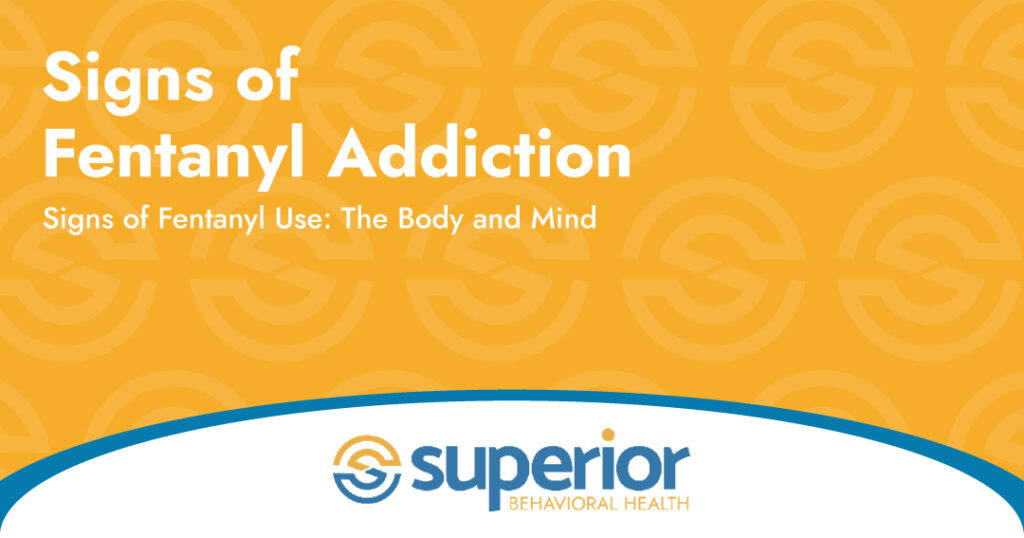Julie’s son has been withdrawing from the family for a while. On days he shows up, some of her medications go missing. Julie has heard he has been spending time with new friends. The neighbors claim his new friends use fentanyl. She worries about her son’s safety. She doesn’t know what signs to look for to know for sure.
In 2022, in Cleveland, 93% of overdose deaths involved fentanyl. At Superior Behavioral Health, we offer same-day appointments. These appointments allow you to start your treatment today before you change your mind. Today, we will be discussing the signs of fentanyl addiction.

Signs of Fentanyl Use: The Body and Mind
Fentanyl is more potent than morphine and heroin, making it great for people experiencing pain. However, it has drawbacks like side effects and withdrawal symptoms when someone stops taking it. Suppose you suspect that a loved one is misusing fentanyl. In that case, there are some signs you can look for regarding a fentanyl use disorder. Not everyone will experience the same signs as someone else.
Behavioral Signs
There are some behavioral signs that someone with a fentanyl use disorder might exhibit. They might lie, steal from loved ones, or engage in dangerous behavior. They might isolate themselves from their loved ones and withdraw from friendships. Many times, people with a fentanyl use disorder no longer participate in activities they used to love.
Psychological Changes
They might also have psychological concerns as well. People who use fentanyl are at an increased risk of developing anxiety, depression, and mood swings. Depression can lead to suicidal ideation. They might have experiences of euphoria, while others might be paranoid. Feelings of confusion are also common.
Physical Changes
Using fentanyl can also result in people experiencing physical symptoms, as well. These might include constricted pupils, drowsiness, insomnia, or breathing problems—some experience gastrointestinal distress like constipation, chronic diarrhea, or nausea.
Fentanyl-Seeking Behavior
People with a fentanyl use disorder will try to seek out fentanyl. They might try to go from doctor to doctor to get fentanyl prescriptions, steal from those that they know who have fentanyl prescriptions, or they might buy fentanyl from drug dealers. Some people might hoard fentanyl, while others take more than their prescription. They might ask their doctor for early refills or be unwilling to try other treatment options their doctor suggested, often because they are more concerned about getting fentanyl than the medical concern they are taking fentanyl for. There are several reasons for this. They might have severe withdrawal symptoms and are uncomfortable discussing with their physician. Untreated mental health conditions that they are trying to self-medicate can also be a reason for seeking out fentanyl.
Withdrawal Symptoms and More
Someone deciding to seek fentanyl use disorder treatment or who has stopped taking fentanyl will experience withdrawal symptoms. They share these symptoms because the body has become dependent on fentanyl and wants more. These symptoms might include insomnia, intense cravings, chills, and aches and pains.
Fentanyl overdoses occur when someone takes more fentanyl than their body can handle. Also, they can occur when someone returns to use by taking the same amount before treatment. An overdose is a medical emergency. If someone is experiencing one, call 911. Naloxone is the best way to reverse the effects of a fentanyl overdose. In Ohio, you can get naloxone without a prescription from your local pharmacist.
Causes and Risk Factors of Fentanyl Use Disorder
There can be several reasons that someone might develop a fentanyl use disorder. Genetics can play a role in a fentanyl use disorder, but this is not always true. While it can come from family history, it can also come from peer pressure. People might even be peer pressured just by observing others using fentanyl. Depression and anxiety can lead to someone developing a fentanyl use disorder. If someone can easily access fentanyl, they might be more likely to use fentanyl.

Get Treatment For Fentanyl Use Disorder in Garfield Heights, OH
At Superior Behavioral Health, we will help you reclaim your life from fentanyl use disorder. We provide options for medication-assisted treatment (MAT), intensive outpatient programs (IOP), and traditional outpatient care – all in one spot. We can help you through each step in your recovery journey. For more information or to get started on your treatment, call us today at 216-435-1110.
FAQs About the Signs of Fentanyl Addiction
What are the signs of eating fentanyl?
People who have been eating fentanyl might have an irregular heartbeat, decrease in urine flow, loss of appetite, and ulcers in the mouth.
Does fentanyl cause muscle cramps?
Fentanyl can cause muscle cramps.


